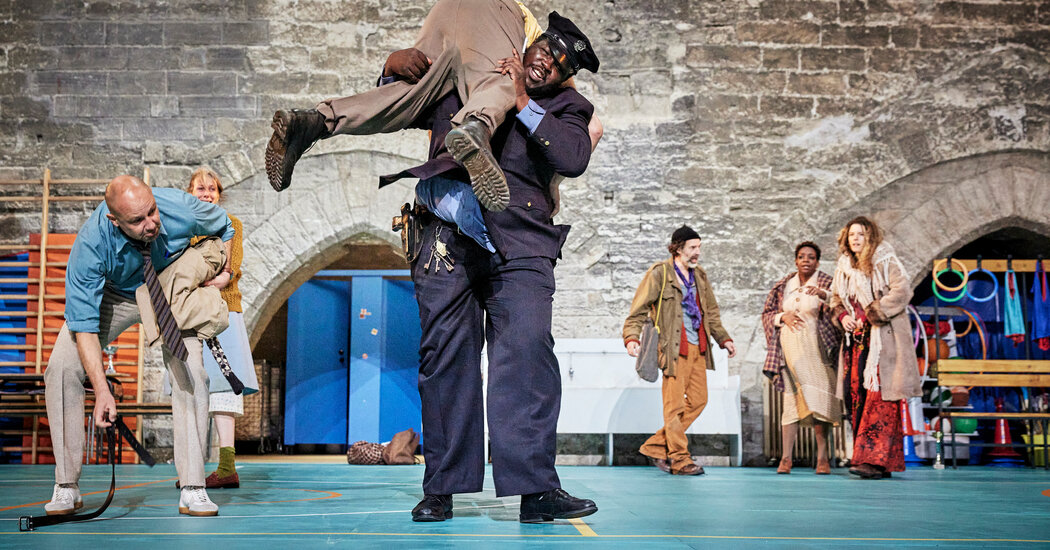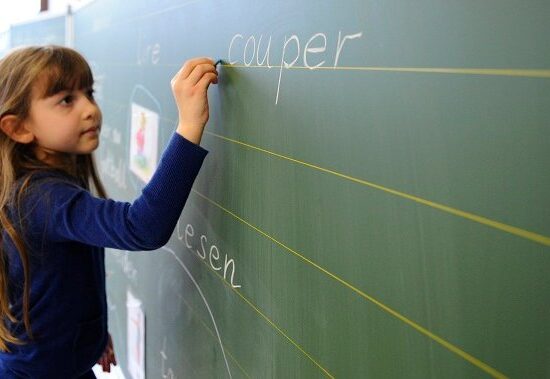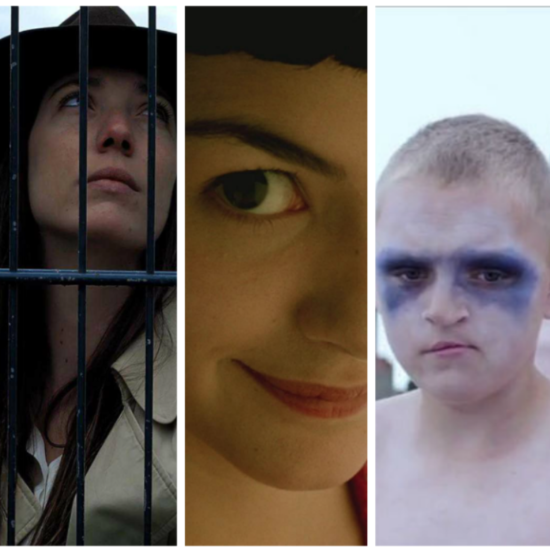
Two events tower over France’s summer festival season each July, held in cities less than 50 miles apart. One, the Avignon Festival, is a bustling, overcrowded celebration of theater; the other, the Aix-en-Provence Festival, offers a more genteel operatic lineup.
This week, well-heeled audiences sat down to opening productions at both festivals. Aix, in lieu of opera singers, unusually welcomed actors from the Comédie-Française, France’s most storied theater troupe, for “The Threepenny Opera,” directed by Thomas Ostermeier; in Avignon, the theater collective In Vitro was supplemented with some new faces for Julie Deliquet’s “Welfare.”
Both productions touched on a subject that was an awkward fit for those affluent crowds: poverty.
Since France has seen the cost of living rise quickly over the past year, it might have felt like an appropriate nod to the times. Yet few things are trickier onstage than asking actors — a profession in which the working class is hardly well-represented — to act “poor.”
In the event, the Comédie-Française fares better than Deliquet’s actors, if only because Bertolt Brecht and Kurt Weill’s 1928 “The Threepenny Opera” is a riotous satire. Its amoral criminals and beggars are over-the-top inventions, and Ostermeier’s visually subdued production derives most of its pleasures from letting the cast’s superb talents loose.
“Welfare” is another matter. It is a close adaptation of a searing 1975 documentary by Frederick Wiseman, who brought his cameras to a New York welfare center and bore witness as claimants dealt desperately with a rigid system. Wiseman himself long wanted to see the material translated onto the stage, and brought the idea to Deliquet, the director of the Théâtre Gérard-Philipe in Saint-Denis, France.
Yet “Welfare,” which shared the opening honors in Avignon with a dance production, Bintou Dembélé’s “G.R.O.O.V.E.,” looks as absurd onstage as it is affecting on-screen. No one involved seems to have realized the insurmountable issue: Re-enacting the hardships of real people with performers turns those people into characters, so their stories lose the ring of truth. Fostering the same empathy takes more work, but here, Deliquet seems hesitant to step in.
It doesn’t help that the unaffected black-and-white cinematography of Wiseman’s film has been replaced here with a technicolor recreation of a school gymnasium, including a bright teal floor that stretches across the vast outdoor stage of the Cour d’Honneur, Avignon’s most imposing performance venue. It’s as if the sitcom “That 70s Show” had opted to tackle welfare benefits, complete with well-cut, visibly new costumes. (Nothing says “my children are about to starve” like a neatly placed red beret.)
The stories told in Wiseman’s film are loosely reorganized here into a day in the life of a welfare center, as case workers deal with one exasperated claimant after the next. One man lost his home in a fire. A couple of recovering addicts are trying to get their lives back on track. A heavily pregnant woman is asked for medical proof of her condition, while the husband of an older lady is withholding her checks.
There are comedic moments in the film, but in Deliquet’s stage version, they start to feel involuntarily farcical. The energetic delivery of the cast may be because they need to project in the cavernous space, which holds around 2,000 spectators. The actors playing the claimants use their moments in the spotlight to play up the injustice of the system, instead of simply exemplifying it, as Wiseman’s subjects did so effectively.
“Welfare” means well, and it’s easy to see why the new director of the Avignon Festival, Tiago Rodrigues, opted to put the project in a prestigious spot. It acts as a statement of change after the lumbering tenure of his predecessor, Olivier Py, and Deliquet is only the second woman director to receive a Cour d’Honneur slot in the 76-year history of the Avignon Festival.
Deliquet deserves it: She is one of France’s top theater-makers, with a string of successes to her name. In “Welfare,” however, she is too respectful of Wiseman’s source material. Some directors, like Alexander Zeldin with his “Inequalities” trilogy, have found the right tone in recent years to tackle underprivileged lives, but “Welfare” looks as if it is playing at poverty.
In Aix, “The Threepenny Opera” may not be an unqualified triumph for Ostermeier, its German director, but at least the show’s roll-call of lowlife misfits is luxuriously cast, and with help from Alexandre Pateau’s sharp new French translation, comes across as it was presumably intended: wry, charismatic, brilliantly individual.
Christian Hecq and Véronique Vella are exuberantly, wackily brilliant as the shallow Mr. and Mrs. Peachum, who set out to take down the notorious criminal Macheath for eloping with their daughter Polly. Not all the actors are equally fine singers, so Vella’s powerful voice is an asset here. So are the vocal talents of Marie Oppert, a recent recruit to the Comédie-Française troupe and a trained singer who, in the role of Polly, turned “Pirate Jenny” into a showstopping number.
Well-crafted scenes come thick and fast in the first half, but the energy tails off later. It’s as if Ostermeier, directing for the first time in an operatic context, stopped short of going truly big. The set designs are minimalistic: four mics downstage, a black platform behind the actors and a few screens above it that show repetitive Russian constructivism-inspired collages. On the main stage of the Comédie-Française in Paris, where the production will transfer in the fall, the company could simply repurpose the very similar set of Ivo van Hove’s 2022 “Tartuffe.”
Maxime Pascal conducts his own ensemble, Le Balcon, who play off the actors well: At one point, a musician even caught a mic Benjamin Lavernhe — a whimsical highlight as the corrupt policeman Tiger Brown — had inadvertently dropped into the pit. Pascal’s reorchestration, adding electronic instruments, lent an intriguing edge to the biting momentum of Weill’s score.
As in Avignon, the production was staged on an open-air stage of historical significance, in the courtyard of the Palais de l’Archevêché, where the festival was born in 1948. While it is reasonably sized compared to the Cour d’Honneur, it’s a prestigious venue, where audience members pay up to $180 for the privilege of seeing “The Threepenny Opera.”
As with “Welfare,” there is whiplash in watching impoverished characters in such rarefied company. But that’s the reality of prestige theater today.













